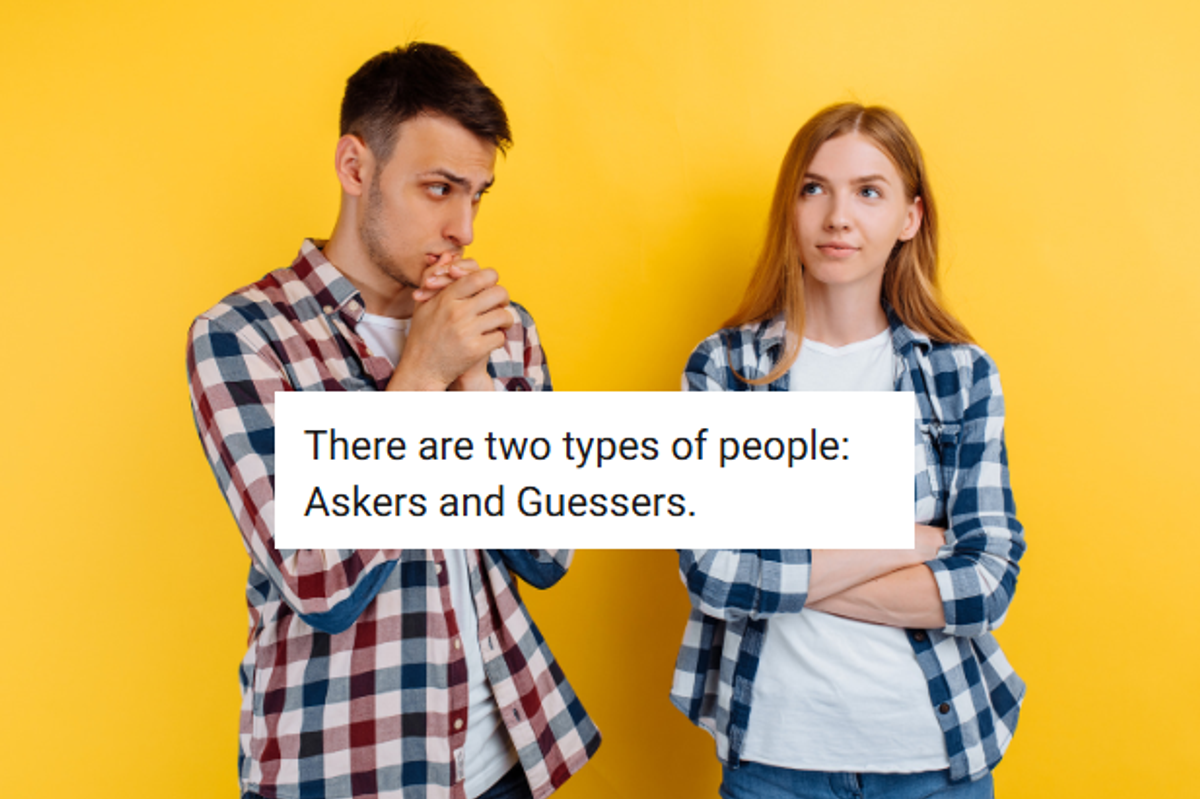Popular podcaster explains why 'Askers' and 'Guessers' make for uncomfortable couples
Are you from an 'ask family' or a 'guess family'?

A man has a question for his girlfriend.
There isn’t a lot of talk about the differences between ask culture and guess culture, but knowing the differences could seriously change how you communicate with people for the better. Understanding the differences will help you respond to requests honestly, without feeling rude, and show you how to ask people for things without feeling too pushy.
What are Askers and Guessers?
The theory is pretty simple, there are two types of people: Askers and Guessers. In “ask culture,” it’s normal and expected to ask people directly for what you want. Conversely, saying no to other people’s requests is also completely normal. In “ask culture,” it’s OK to make a direct request, and no feelings are hurt if you receive a direct no. The ask culture motto is: No harm in asking, right?
In “guess culture,” you only ask for things if you are sure you will receive a yes. Guessers are more likely to drop hints or make suggestions to someone to gauge their interest and avoid being forthright. To the Guesser, this approach is more polite because you aren’t putting the other person in an uncomfortable position of having to say no. It also saves the Guesser’s face because they don’t have to suffer the pain of rejection.
The two cultures clash when it comes to saying no. Askers will make a request even though there’s a big chance the other person will say no. Because Guessers won't ask if the answer might be no, they might assume Askers expect all of their asks to be answered with yes. Guessers are uncomfortable telling someone no because it feels rude, so they are put in a very awkward position when confronted with an Asker's unrealistic request.
Jessie Stephens, host of the "Mamamia Out Loud" podcast, explained how the Asker versus Guesser dynamic creates uncomfortable situations in her marriage.
@mamamiaoutloud I have only just learned that “ask” families exist 🙃
“I’ve since had an epiphany that this is a central tension in my relationship with my partner. So, I absolutely grew up in a Guess family,” Stephens said in a clip with over 330,000 views. “In our family, it is understood that when you ask something of someone, you put them in the difficult position of potentially having to say no. So, if I ask someone a favor, for example, that’s a lot of pressure. So you’re going to really consider whether or not you do that to someone.”
However, Stepens' partner is from an Ask family.
“And in Ask families, you just say what you want or what you need, and it’s on the other person to say yes or no,” she continues. “There’s no pressure, he accepts the no, there’s nothing emotional in it. Don’t be passive-aggressive. Just say what you want.”
Stephens adds that there is a gender dynamic to the theory. “Interestingly, in the research around this, there is a gendered element because apparently, men are often, um, able to ask more freely for the things that they want, whereas women are disproportionately guesses," she concludes her video.
Ultimately, the Guesser and Asker theory is a way to help people understand one another more easily. If you’re a Guesser, don’t feel uncomfortable telling an Asker no because they have little fear of being turned down and may expect it. If you’re an Asker, listen to the clues when a Guesser seems to hint they need help so you can give them what they need. If they’re throwing it out there, it’s because they’re sure you’ll say yes.
- Need help with a rude kid? Teachers share 9 ways to deal with kids who make rude comments. ›
- How I found my life's passion by asking myself these ridiculous questions. ›
- One couple's perfect response to people asking when they're going to have kids. ›
- The life-changing magic of knowing whether people are 'Askers' or 'Guessers' ›





 The first deposit of orange peels in 1996.
The first deposit of orange peels in 1996. The site of the orange peel deposit (L) and adjacent pastureland (R).
The site of the orange peel deposit (L) and adjacent pastureland (R). Lab technician Erik Schilling explores the newly overgrown orange peel plot.
Lab technician Erik Schilling explores the newly overgrown orange peel plot. The site after a deposit of orange peels in 1998.
The site after a deposit of orange peels in 1998. The sign after clearing away the vines.
The sign after clearing away the vines. Prokop Vejdělek, at age 22 and 101
Prokop Vejdělek, at age 22 and 101










 gym GIF
gym GIF One of the predecessors of modern gym equipment
One of the predecessors of modern gym equipment Bicep curls, anyone?
Bicep curls, anyone? Precursor to the stationary bike?
Precursor to the stationary bike? Something like horseback riding?
Something like horseback riding? Clearly isolating the foot and/or leg. For what, though?
Clearly isolating the foot and/or leg. For what, though? What does this machine even do?
What does this machine even do? Women also demonstrated Dr. Zander's exercise machinery.
Women also demonstrated Dr. Zander's exercise machinery. Do we even want to know what this machine does?
Do we even want to know what this machine does? Couple lounging on the hood of a car.
Photo by
Couple lounging on the hood of a car.
Photo by  Woman wearing black sweater holding hand with man wearing gray suit jacket.
Photo by
Woman wearing black sweater holding hand with man wearing gray suit jacket.
Photo by